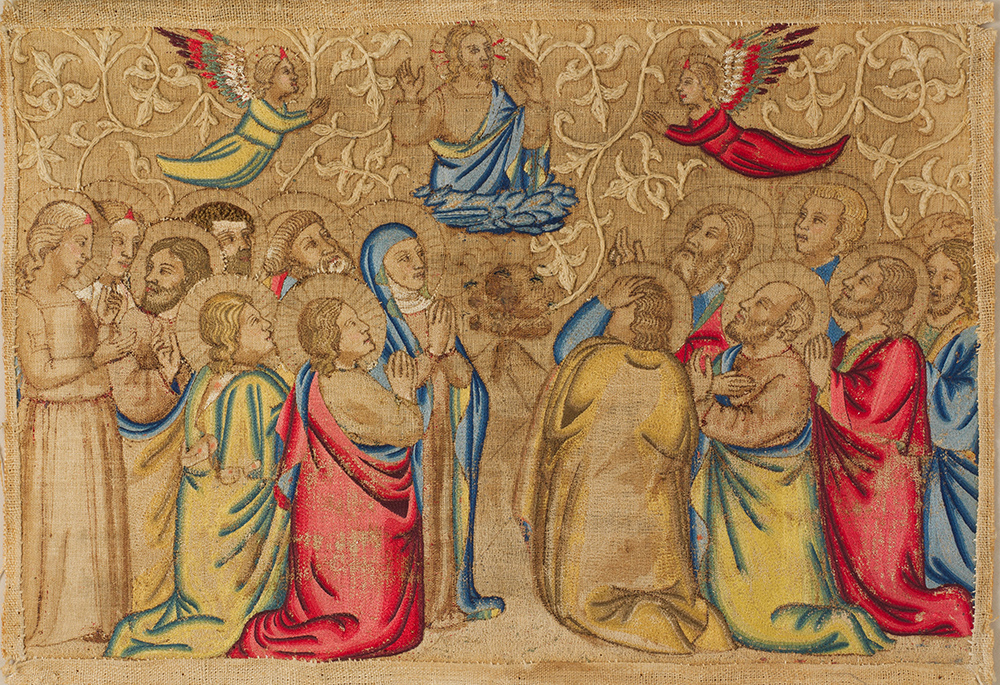Carolyn Ancell is a writer and musician in Tucson, Arizona. She has authored 18 books and numerous articles on liturgy and the liturgical arts and is a retired "chaplain with a harp."
<div style="text-align: center;"><div style="margin-bottom: 10px; padding-bottom: 10px; border-bottom: 1px dotted #ccc;" class="full_width_image"><img style="width: 624px; max-width: 100%;" src="https://www.ncronline.org/files/styles/email_newsletter_full_width/publ… style="color: #04619d; text-decoration: none;" href="
<div style="text-align: center;"><div style="margin-bottom: 10px; padding-bottom: 10px; border-bottom: 1px dotted #ccc;" class="full_width_image"><img style="width: 624px; max-width: 100%;" src="https://www.ncronline.org/files/styles/email_newsletter_full_width/publ… style="color: #04619d; text-d

"The Ascension," a 14th-century embroidery made in Florence, Italy (Metropolitan Museum of Art)
Many New Testament stories appear to be variations of one another with minor adjustments. Not so Jesus' ascension. What the different accounts have in common is that Christ appeared among his disciples and missioned them to continue his work. (In the Gospel stories, Mary Magdalene is the only person Christ appeared to individually.)
According to John, Jesus appeared three times, commissioning the disciples to forgive and instructing Peter to feed his sheep. John mentions no ascension. Matthew describes how Jesus called the disciples to a mountaintop from where he sent them to spread the Gospel to the whole world and to baptize and pledged to remain with them until the end of time. Luke ends his Gospel with Jesus departing from Bethany, telling the disciples to remain in Jerusalem until the promise of the Father would fall on them. In the Acts of the Apostles, the second volume of his Gospel, Luke begins where he left off, narrating the departure and presence of the risen Lord with more detail than anywhere else.
According to most scholars, Mark ended his Gospel with verse 16:8, saying that the women fled from the empty tomb and said nothing to anyone because they were afraid. Mark apparently ended this way to provoke his community. Writing around the year 70, not long after Peter's martyrdom, Mark's audience knew persecution and had reason to be frightened. Mark wanted to jolt them beyond their fear. Mark's community knew that the women really did spread the word; the Gospel was being preached. Still, Mark was warning the community that if they remained afraid or used any other excuse to avoid giving witness to the risen Lord, the message would disappear.
Unsatisfied with Mark's disappointing ending, later scribes wrote more "adequate" conclusions and added some spectacular signs among those who preached the Gospel message. We hear this version today.
Examining Luke's account of the Ascension in Acts, we note that before saying that Jesus promised the disciples that they would be baptized in the Holy Spirit, he gave his followers "instructions through the Holy Spirit." Then, as he was about to be taken up, Jesus again promised, "You will receive power when the Holy Spirit comes upon you."
Throughout his Gospel, Luke mentions the Spirit no fewer than 15 times. Luke depicts the Spirit's presence from the moment an angel announced the birth of John the Baptist through Jesus' ministry and beyond. Luke presents the reception of the Spirit at Pentecost as the apex, not the first or last activity of the Spirit among Jesus' disciples. For Luke, the Spirit's presence in and to the disciples is a process, not a once-for-all event.
Advertisement
In his Letter to the Ephesians, Paul gives helpful ideas about the Spirit-power the disciples received. Paul teaches that the power to carry out Christ's mission bestows wisdom, revelation, knowledge of Christ, enlightenment, hope, and a share in the riches of Christ's glory. For Paul, these qualities summarize the effects of following Christ and sharing his Spirit.
No matter how they depict it, each Gospel proclaims that the risen Christ made himself present to his disciples and handed over his mission with the promise that they would have the grace and strength to carry it out. This tells us that the feast of the Ascension is not about absence, but mission.
The feast of the Ascension is not about absence, but mission.
Luke's narrative shows that the Spirit of God was uniquely active even before the angel gave Mary the mission to be Mother of God and continues working in all who are willing to let Christ become present through them. The feast of the Ascension commissions Christ's followers through all ages, reminding us that Christ's mission continues through us and that the grace to accomplish it remains ever available to us. This is the point Luke made by saying that Jesus instructed the disciples to wait for the Holy Spirit. They knew the Spirit's presence, but needed to grow in it as they started to do what Jesus did.
We might note that the message of the Ascension is particularly apt as we participate in the synod on synodality. Jesus gives us his mission, and also the Spirit that empowers us to accomplish it. Like the disciples sent to wait in Jerusalem, instead of planning and carrying out what we think is right, our times call us to listen to the Spirit Christ bestows on all disciples.
The Spirit of Christ calls forth an innumerable variety of expressions of Christ's mission. To the extent that we are open, the Spirit will keep awakening us to the richness discoverable only in a community of believers on mission.

(Unsplash/Emmanuel Phaeton)
"God shows no partiality." Really? Not even between people who cheat immigrant workers and those who risk their lives for others? What about Vladimir Putin and the Ukrainians, or Benjamin Netanyahu and Palestinian children? What about … ? Well, you name them.
This is tough if it is supposed to apply to us. Peter and the early Christians faced this sort of dilemma when "gentiles" (read pagan idolaters) began to share the same faith as disciples and the Jewish converts. For them as for us, buying into the breadth of God's love may entail more than we might want to give.
Luke set up today's incident from Acts with two dreams. First, Cornelius, the centurion, dreamt that God wanted him to meet Peter. Peter dreamt of a giant picnic blanket laden with every imaginable kind of food, kosher and nonkosher, lowered before him. He was told to enjoy every variety. (Remember Tevye's dream in "Fiddler on the Roof"?) Of course, Peter refused the forbidden food until the divine message got through: "What God has made clean, you are not to call profane" (Acts 10:15). As the dream ended, messengers arrived, inviting Peter to Cornelius' home. We might call this a "providential coincidence."
Coincidental? More like providential. From the very beginning, "providence" called the Christian community to see beyond their own plans to grasp what the Holy Spirit was working in the world, what today's Psalm calls God's saving power for all nations. This underlines the humbling truth that the Spirit does not belong to any nation, tongue, denomination or religious tradition. God's Spirit blows in all directions, leading toward the future that God created us for. Our part is to wonder at and appreciate how God's saving power extends to "all the ends of the Earth."
Today's anecdote from Acts gives us the real-life story that incarnates the teaching of 1 John and today's selection from Jesus' last discourse. According to the New American Bible, the First Letter of John is not so much a letter as a commentary on the Gospel of John and a defense of Jesus as truly human and divine. What we hear today can be taken as a commentary on today's Gospel message about love.
We can interpret our Gospel passage from a variety of perspectives. We could focus on the command to love, or the idea that Jesus was ready to lay down his life for his friends or even the promise that the Father will grant anything we request in the name of Jesus. Reading this selection in relation to the first reading leads to a surprising connection with Jesus' teaching that he has chosen us in order that we might share fully in his joy.
The feast of the Ascension is not about absence, but mission.
This begins with Jesus' invitation to remain in his love. The idea of remaining might sound like a stopping point, but it's really the opposite; dwelling in Christ's love calls us to live more deeply, more passionately, to allow Christ's love to activate everything we do.
Dwelling in Christ's love changes everything. Peter learned this with Cornelius. Harking back to the many times that Jesus went beyond the letter of the law to fulfill its purpose instead, Peter was drawn to allow love to prod him beyond the limits of his religious tradition and into the depths of what faith in Christ could call forth. The result was the joy of unexpected unity and eventually the joy of becoming free from legalities that limit the communion that can happen among very diverse people who share the same hopes.
We've heard the call to love one another, perhaps too frequently. But Christ's love is what the readings of the Sixth Sunday of Easter call forth from us and this call is likely to make us uncomfortable. Peter was uncomfortable about eating nonkosher food and communing with gentiles. Seeing the Holy Spirit at work in them transformed his mindset.
Advertisement
Accepting gentiles seems to pale in the light of the divisions we know today — at least the gentiles desired to know Christ. But what about those we believe are destroying life? People in whom we do not recognize any genuine faith?
This is where "remain in my love" becomes the key to our transformation. When Christ's kind of love feels impossible, perhaps a solution can be found in the first three of the 12 steps: to admit that we are powerless to love like Christ, to believe that God's grace can work wonders in us, and to invite God to accomplish in us what we cannot. Then, as people begotten by God, we too can believe what Gabriel told Mary, "For God, nothing is impossible." Our "new possible" even includes loving those we would rather despise.
Believe it or not, Christ promises it will bring us fullness of joy!
<h2><a style="color: #04619d; text-decoration: none;" href="https://www.ncronline.org/opinion/ncr-voices/trump-no-champion-pro-life… is no champion for the pro-life cause</a></h2><div style="font-weight: bold; font-size: 15px; font-family: Arial, sans-serif;" class="byline">by Michael Sean Winters</div><div style="font-size: 19px; font-family: 'Georgia', serif;"><p>By aligning itself wit




